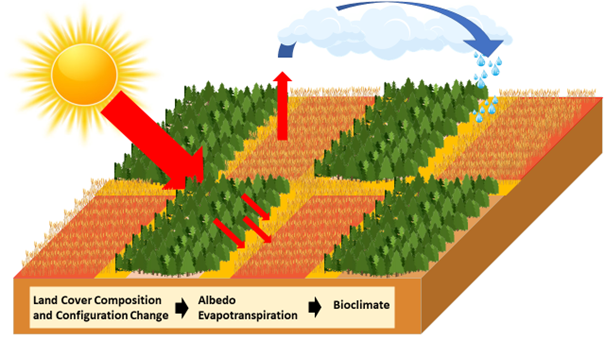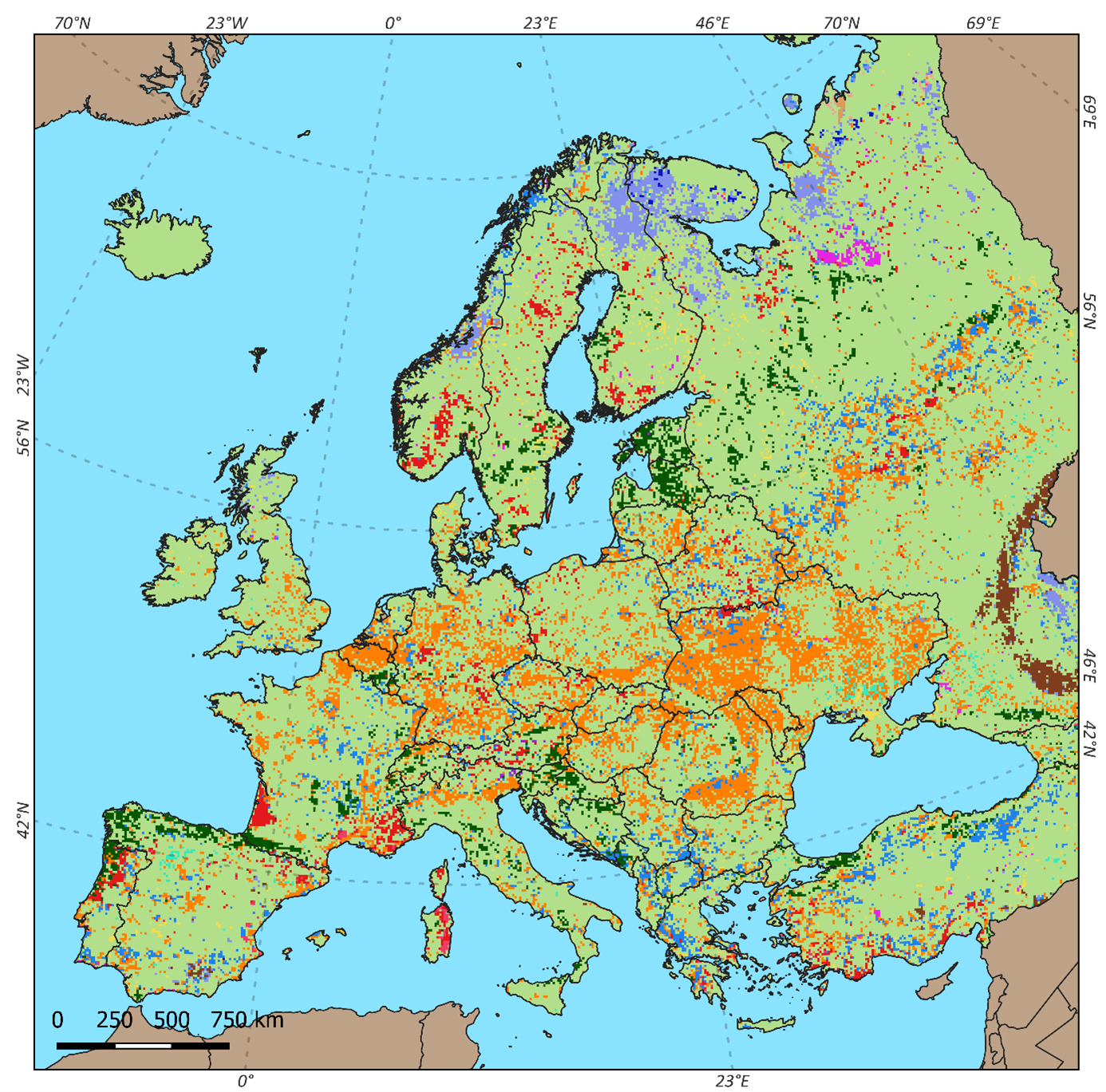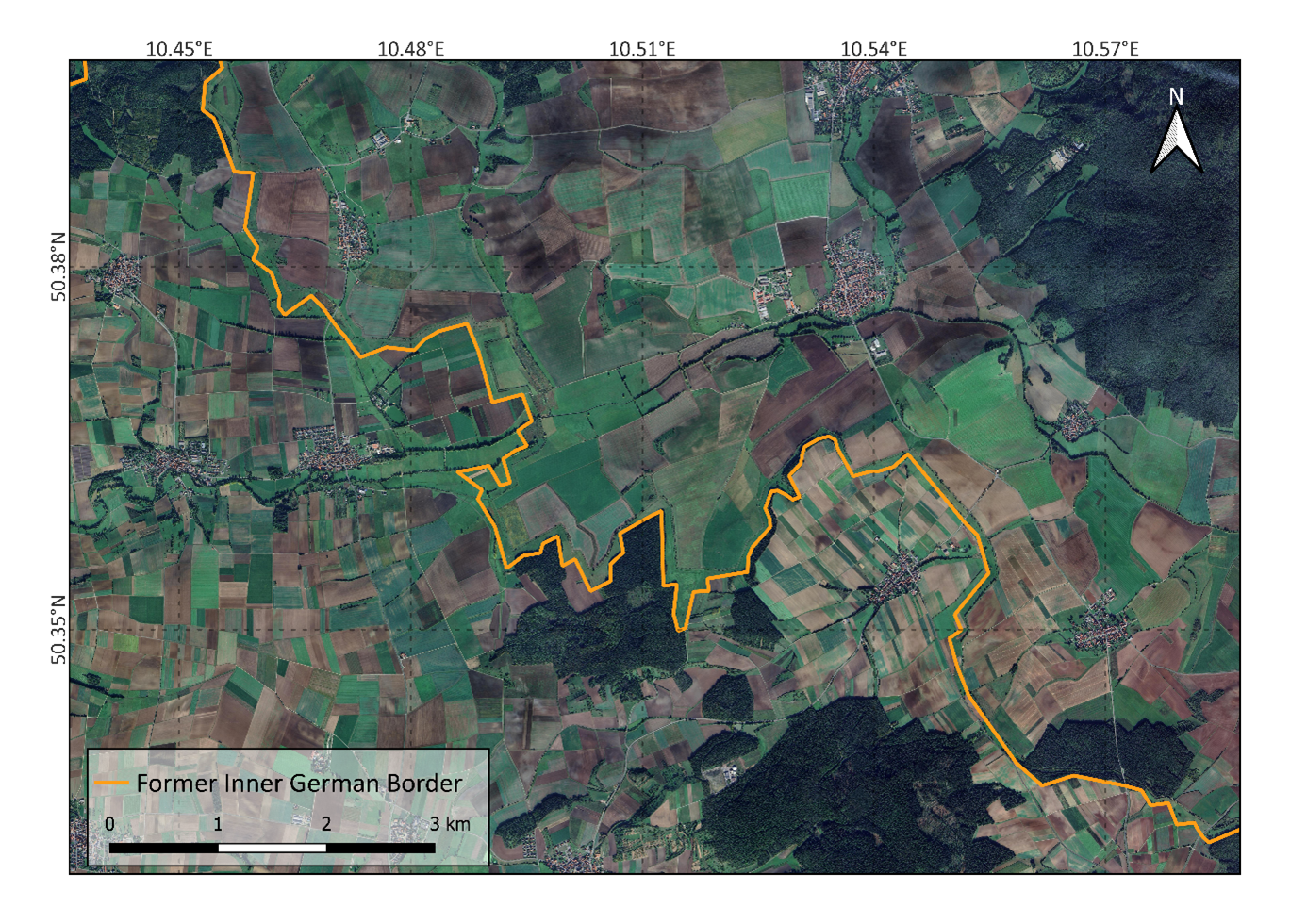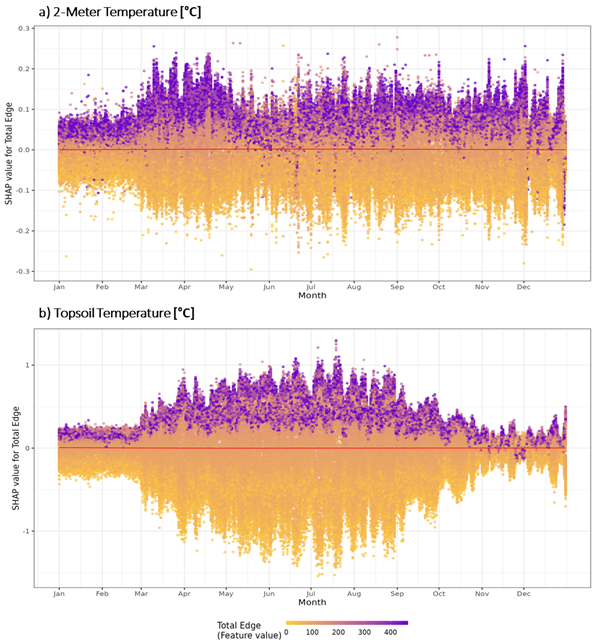A06
Processes and determinants of climate-relevant landscape configurations
Prof. Dr. Jan Börner
University of Bonn | +49-228-733548 |
Prof. Dr. Thomas Heckelei
University of Bonn | +49-228-732332 |
Prof. Dr. Silke Hüttel
University of Göttingen | +49 551 39-24851 |
Marco Ferro (PhD student)
University of Bonn | +49-228-732324 |
Summary
In this project, we explore the effects of changes in land cover composition and configuration on climate in the CRC study area. Our focus lies on the processes and economic consequences of changes in the composition and configuration of landscape elements that regulate coupled land and atmospheric water and energy cycles. These elements include the abundance and spatial arrangement of crops, forests, and grasslands. Using coupled regional climate models, we assess the climate impacts of land cover composition and configuration spatiotemporal patterns, and apply econometric methods to causally link these compositional and configurational shifts to economic outcomes.
Graphical summary

Figure 1: Graphical representation of the processes that may mediate the relationship between land use and land cover changes and climate dynamics.
Contribution to the CRC
Under the central hypothesis that land cover change (LULCC) affects regional climate dynamics, the knowledge generated in this project and in partner project A05 will inform the development of LULCC scenarios for Earth system modeling in the CRC. This project focuses on two climate-relevant characteristics of LULCC: the composition and configuration of land uses. It quantifies the extent to which changes in land cover composition and configuration affect the regional climate and identifies entry points for climate-smart land use governance.
Approach
We employ a multidisciplinary approach to test our hypotheses, structuring our work into three packages. First, we detect changes in the composition and configuration of land cover in the CRC study area. Then, we use a regional climate model to test the climate relevance of these changes. Second, we perform simulations with the regional climate model to analyze the contribution of changes in land cover configuration to the overall effect on bioclimate variables. Third, within a causal inference framework, we demonstrate how compositional and configurational landscape differences can have economic impacts through changes in biophysical processes, such as water and energy cycles.
Main results in 2022
We reviewed the literature to understand how changes in land cover composition and configuration can affect climate dynamics. We found that the climate consequences of changes in land cover composition (e.g., the transition from forest to cropland) are well documented in the CRC study area. However, the effects of changes in land cover configuration on climate are still poorly understood. Therefore, we selected a pool of landscape metrics likely connected to climate-relevant processes and created a dataset of changes in these metrics across Europe between 1992 and 2015.
Main results in 2023
We used a range of LULCC metrics between 1992 and 2015 and applied Self-Organizing Maps to characterize dominant land cover composition and configuration trajectories in Europe. We then tested the climate relevance of the five most dominant trajectories with a high-resolution regional climate model. Land cover composition and configuration simultaneously changed in more than 20% of the European landmass, with cropland transition to forest patches and bare soil representing the major trajectory. Climate model simulations predict a general increase in the topsoil temperature due to only changes in land cover composition and configuration. All trajectories showed increasing topsoil temperature variability during the crop growing season, with forest transition trajectories showing a greater increase. Our findings demonstrate the relevance of changes in both land cover composition and configuration for the local climate and warrant further empirical and model-based research with an explicit focus on quantifying the effects of simultaneous changes in both these LULCC dimensions.
Data are available at: https://detect-z03.geoinformation.net/geonetwork/srv/ita/catalog.search#/metadata/2668f0cb-dd40-439f-9102-501a4c20d1fb
Figure 2: Land cover composition and configuration trajectories in Europe between 1992 and 2015.
Main results in 2024
We established a causal link between differences in land use composition and configuration and an economically relevant outcome. Using a novel remote-sensing product, we measured spatial variations in grassland drought impacts during the prolonged drought and heatwave of 2018. We related these variations to a composite index of landscape simplification drawn from landscape metrics. Our causal identification strategy employs a spatially explicit fuzzy regression discontinuity design (RDD), leveraging Germany’s former inner border as an exogenous predictor of agricultural landscape simplification intensity. Our results show that increasing agricultural landscape simplification from the 25th to the 75th percentile raises the proportion of drought-affected grassland by approximately 3.8 percentage points. Our results suggest that decreased drought resistance may be a consequence of landscape simplification, which could lead to economic losses for farmers in the form of foregone revenues.

Figure 3: Satellite image (ESRI World Imagery) of agricultural landscapes at the former inner border (orange line); left: smaller fields and higher land use diversity in western Germany; right: larger fields and less diversity as a result of land collectivization reforms (1949–1989) in eastern Germany.
Main results in 2025
Although the climatic consequences of changes in land cover composition are well documented, the influence of different land cover configurations is not. Therefore, we used a high-resolution, convection-permitting regional climate model (RCM) to examine how different landscape configurations affect relevant biophysical processes through a multi-scenario experiment. We used neutral landscapes as input for the RCM and combined machine learning models with SHAP values to distinguish direct from mediating effects. Our results showed that changes in land cover configuration measurably affect topsoil and 2-meter temperatures when composition remains constant. Increasing fragmentation produced a general warming effect that is more pronounced over cropland during the growing season. These findings supported the hypothesis that rising landscape fragmentation undermines the ecosystem’s capacity to regulate the local climate. More broadly, our study demonstrated the potential of RCMs to address critical questions about land systems and to promote interdisciplinary research at the intersection of climate and land use studies.

Figure 4: Dependency plots of SHAP values for Total Edge (ED) in relation to (a) 2-meter temperature and (b) tospoil temperature predictions. Each dot represents one observation, showing how the ED value influenced the model's prediction for temperature. Results suggest that increasing land cover fragmentation increases both temperatures.
Conference Presentations:
Aug 2023: Presentation at the European Association of Agricultural Economists (EAAE) Conference, Rennes (FR).
Nov 2024: Presentation at the Global Land Programme (GLP) Conference, Oaxaca (MEX).
Aug 2025: Presentation at the European Association of Agricultural Economists (EAAE) Conference, Bonn (DE).
Publications
Burchfield E, Ferro M, Hüttel S, Lakes T, Leonhardt H, Niedermayr A, Rissing A, Seifert S and Wesemeyer M (2024) Towards a comprehensive analysis of agricultural land systems in the EU and US: A critical view on publicly available datasets, Land Use Policy 147 107371,
Online: https://www.sciencedirect.com/science/article/pii/S0264837724003247
Ferro M, Börner J, Hüttel S, Kowalski K, Hostert P and Kis-Katos K (2025) The causal effect of agricultural landscape simplification on Germany’s grasslands during a compound drought and heatwave in 2018, AgEcon Search, Series: 26,
Online: https://ageconsearch.umn.edu/record/355805?v=pdf
Ferro M, Dutta T, Hüttel S, Lindner M, Poll S and Börner J (2025) Climate-relevant land cover composition and configuration trajectories in Europe, Environ. Res. Lett.,
Online: http://iopscience.iop.org/article/10.1088/1748-9326/adc8be

